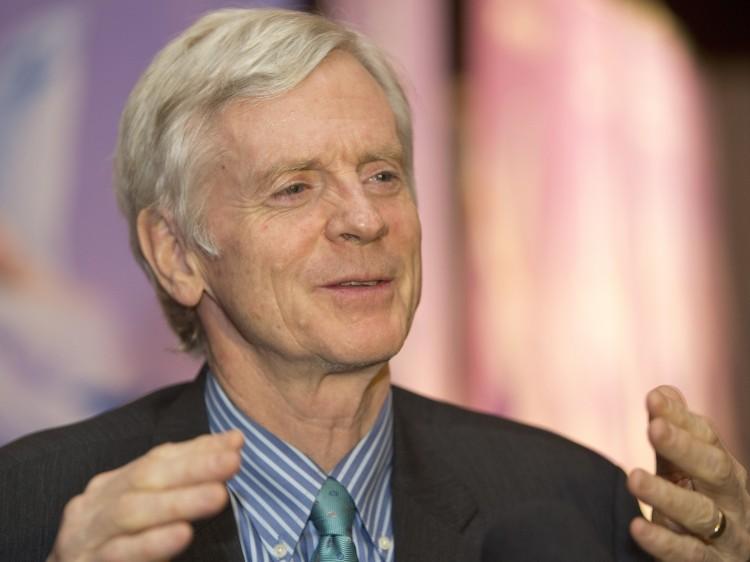Even with the heads of Westerners appearing to be severed on social media, it is difficult for anyone beyond the traumatized survivors of ISIL massacres to comprehend ISIL’s mindless savagery. Earlier, its jihadi attacked the peaceful Yazidis in Iraq, killing many and forcing tens of thousands to leave their homeland. Its recent attack on Kobani and surrounding villages resulted in 130,000 terrified Syrian Kurds fleeing into Turkey.
Muslim leaders around the world have repudiated ISIL. Iyad Madani, secretary general of the Organization of Islamic Cooperation, representing Muslims in 57 nations, said ISIL “[has] nothing to do with Islam and its principles that call for justice, kindness, fairness, freedom of faith, and coexistence.” Virtually all of the world’s Muslims reject ISIL’s claim to speak for them.
Barack Obama was correct this week at the United Nations concerning the threat: “No God condones this terror. … No grievance justifies these actions. There can be no reasoning—no negotiation—with this brand of evil. The only language understood by killers like this is the language of force … the [U.S.] will work with a broad coalition to dismantle this network of death.”
Formerly, ISIL operated as al-Qaeda within Iraq, but terminated all links to the older terrorist group early this year. Al-Qaeda had concluded on its part that ISIL was too brutal even for it. The two groups now compete for influence among Islamist extremists both locally and internationally.
With savvy use of social media and local agents, ISIL recruits worldwide. Foreign volunteers to date in Syria and Iraq are estimated to include “dozens” of Canadian citizens and an estimated 2,000 from Europe.
Christian Leuprecht, a security expert at Canada’s Royal Military College and Queen’s University, said that a recent video threat by an ISIL representative to kill anyone whose country has joined the coalition against it is a “genuine risk. It’s something that needs to be taken seriously.” A just-released Nanos/CTV opinion survey indicates that almost 76 percent of Canadians “agree” or “somewhat agree” that homegrown Canadian jihadi inside Canada are a significant threat to our security.
Regional Considerations
The swath of land about the size of Belgium seized by ISIL within Iraq and Syria now contains many enslaved communities. The group cannot currently defeat the governments of Syria or Iraq, but one map of its declared Sunni caliphate includes part of North Africa. The beheading of a French tourist by a group in Algeria allied to it in recent days tends to confirm such aspirations.
ISIL fighters are Sunnis in an ongoing conflict, which is now both Shiite-Sunni and Sunni-Sunni. A majority of Iraqis are Shiite, but Sunnis dominated Iraq under Saddam Hussein, a Sunni, who claimed incorrectly for years that Sunnis were the majority in Iraq.
Nouri al-Maliki remained Iraq’s prime minister for eight years until August with ongoing ill-advised support from both the Bush and Obama administrations. Under constant direction from violent Shiite clerics in Iran—long the epicenter of Islamist terrorism—Maliki exacerbated sectarian conflicts at home by refusing to respect Sunni and other Iraqi communities. His police shot peaceful Sunni protesters, misused terrorist laws to arrest and torture Sunnis, and maintained Shiite militias.
Maliki’s abuses of his office assisted the ISIL recruitment cause among disenfranchised Sunnis across Iraq, yet even his Shiite-dominated army would not fight ISIL. The new prime minister, Haider al-Abadi, has promised to include Sunnis in his government, but time is very short to undo years of damage to national cohesion when barbarians are almost literally at the gates of Baghdad.
Secretary of State John Kerry’s suggestion at a hearing of the Senate foreign relations committee that the task of defeating ISIL might in some circumstances fall to Iran and the Syrian government could heighten Sunni suspicions that the United States secretly intends to ally with Shiite governments in Iran and Syria against it.
Obama must assure Sunnis that he has no such intention. The brutal Assad regime in Syria must be neither worked with nor strengthened by the international coalition against ISIL.
America appears finally to have seen the necessity of taking action with others on global security issues. It and other responsible members of the international community, including Canada, must stand together against ISIL for as long as necessary. The international coalition needs much more help from countries in the region, especially Turkey, but we must all help to make it work.






